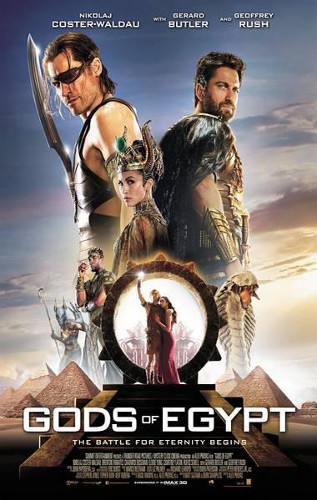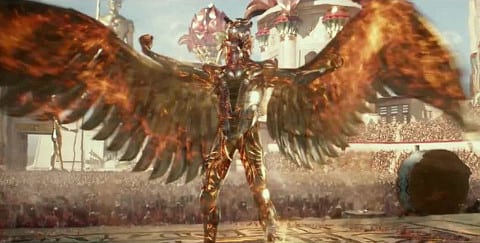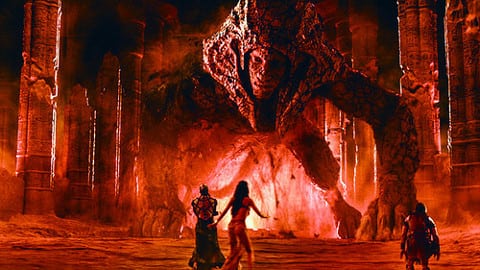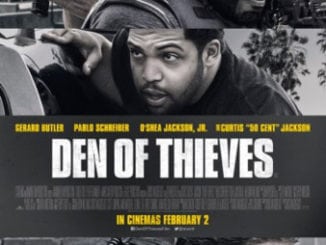Gods of Egypt (2016)
Directed by: Alex Proyas
Written by: Burk Sharpless, Matt Sazama
Starring: Brenton Thwaites, Elodie Yung, Gerard Butler, Nikolaj Coster-Waldau
USA
IN CINEMAS NOW
RUNNING TIME: 127 min
REVIEWED BY: Dr Lenera, Official HCF Critic

In Ancient Egypt, the world is flat and gods, who are distinguished by their greater height, golden blood, and ability to transform into animal-headed deity forms, live with humans. Mortal thief Bek and his love Zaya are attending the coronation of Horus, lord of the air, by his father, the abdicating King of Egypt Osiris. During the ceremony Osiris is killed by his jealous brother Set, god of the desert, who seizes the throne and declares a new regime where the dead will have to pay with riches to pass into the afterlife. Horus is stripped of his eyes, which are the source of his power, and exiled while his wife Hathor becomes an enslaved mistress to Set. A year later, Egypt is in chaos. Bek works as a slave building monuments, while Zaya is now under the ownership of the chief architect Urshu. Believing that Horus is the only one who can defeat Set, she gives Bek the floorplans to Set’s treasure vault, where the eyes of Horus are, but is then killed by Urshu….
I’m never one to avoid sensitive issues, but I’ll get the whole ‘whitewashing’ thing [this film has been much criticised by having Ancient Egypt chiefly populated by white folk, and director Alex Proyas even apologised for this way before it was actually released] out of the way first with four points and then go on to review the film. 1. This is a fantasy, and is not intended whatsoever to reflect reality. 2. There are hardly any Egyptian or even Middle Eastern faces, but the Egyptian film industry is hardly booming. 3. There are some black faces. Not enough, but some. 4. Proyas was born in Egypt, to Greek Egyptians, and looks as white as they come.
Slated by many of the critics and a box office bomb, Gods Of Egypt, if the IMDB is anything to go by, does seem to be liked by many of those people who have decided to actually go and see the film. I was somewhat prone to liking it before I even watched it considering that Ancient Egyptian mythology has hardly ever been depicted on film. Sure, we’ve had all those Mummies and a hell of a lot of curses, but most Ancient Egyptians would have found the idea of a walking bandaged corpse ridiculous. Five minutes into the film, and it was obvious that, while it does borrow from a few Ancient Egyptian myths as well as being influenced by certain Greek ones like the story of Orpheus and Eurydice, Gods Of Egypt was just going to be another dumb Hollywood blockbuster [or would-be blockbuster, in this case] drowning in variable [in this case, far more bad than good] CGI, and a considerable disappointment from the director of one of the greatest science fiction movies of the 90s. Once you realise this though, it’s not that bad really. It can’t be faulted for its ambition, there are some very memorable images, and it’s certainly never dull until the effects totally take over towards the end. And there is some solid and quite diverse action in places. When I see one god about to do battle with two other gods riding giant snakes, I was able to flash back to not only the first time I saw classics like Jason And The Argonauts as a kid, but also the first time I read The Illiad [I was so into my Greek mythology as a child] and pictured all those gods fighting each other, something never shown in all the films that have been made about the siege of Troy.
This film does have a lot of problems, the two main ones being the script [well, what do you expect from the writers of Dracula Untold and The Last Witch Hunter?] and the quality of many of the special effects, but it’s certainly no Immortals, and is rather better than, say, the remake of Clash Of The Titans. This is one kind of movie that, despite all the increases in technology, rarely seems to be done as well as it was in, say, the 1960’s anyway. This particular one certainly has its bravura moments though, including the brilliant opening where the camera moves above the River Nile and swoops down to a crowded market, a moment where, unusually in this film, you can’t see the joins. Unfortunately we then get into a scene with truly terrible dialogue as Horus is talking with one of his concubines. Of course it’s hard in historical pictures to get the talk sounding right, but in trying to avoid the stilted dialogue of many older movies, screenwriters Matt Sazama and Burk Sharpless often have people speak somewhat random and semi-comic lines which don’t come off well either. There’s one character, Thoth, who is supposed to be the god of wisdom but just talks a load of nonsense throughout and seems to be in a different story.
It’s not long before we get a very Marvel-style battle between the two Gods Set and Horus, except that the CGI really does look astonishingly cheap, something that, except for a few good bits here and there, is repeated throughout the film. The compositing is often especially bad – there’s a chariot flight where the background looks like back projection from the 1950’s [it’s easy to forgive it in a film of that vintage but there aren’t really any excuses for it in a modern picture] – and a crowd scene where it’s hilariously obvious that one group of distant CGI figures has just been replicated all over the screen [of course this technique is done a lot, but it shouldn’t be so damn obvious]. A sequence where Bek runs through a collapsing pyramid is so ridiculous that even Peter Jackson may have balked at filming it, but it just looks awful too. When a film is so reliant on its effects as this one, it’s bizarre how the producers, let alone Proyas, who tends to have impressive technical work in his films, just didn’t seem to care how this one looked at all. Still, there are some stunning images here and there which are at least admirable in conception, like when the God Ra, in his solar barge, drags the sun above the horizon of a flat Earth.
There’s no shortage of incident as the mortal Bek and the immortal Horus, revived by Bek to bring Zaya back to life, journey all over the place, from the Heavens to Hell itself, encountering perils, from elaborate traps to rock monsters, every few minutes, while at the same time Set is conquering everywhere and killing off all the other gods and goddesses one by one. There is a nice carefree sense of adventure and fantasy, as if anything can happen, though that doesn’t quite negate the stupidity of some moments liike when Osiris is murdered and the rest of the gods are present but don’t team up and attack him. Or when Bek is thrown 40 feet onto some stone and gets up without even a scratch. An emotional dimension is provided by the love of Bek for Zaya, who is unable to pass into the proper afterlife and is trapped in limbo, though the way this part of the story is resolved is very lame and makes little sense, while the romantic story of Horus and Hathor is unconvincing. Despite the major aural and visual flaws Gods Of Egypt possesses, it’s hard to really dislike until the boring final 15 mins or so where all eternity is threatened by a dull looking monster thingie. And, very occasionally, a scene does come off very well, as if one of the two co-writers wrote most of the script and the more talented other writer just did certain scenes. A good example of this is a bit where Set visits his grandfather Ra, which is intelligently handled and actually makes the viewer feel a bit of sympathy for the evil Set.
The performances are all over the place and often seem to be taking place in different films to each other. Gerard Butler is most amusing to watch as he stomps about waving his staff about and shouting, like 300‘s Leonidas on coke, though Geoffrey Rush, for once, can’t hide the fact that he’s in it just for the paycheck. Marco Beltrami’s score is an odd mixture of excellent, evocative musical moments, and a sense that the composer’s just going through the motions with music that could come from any number of other film music writers in similar films today. Gods Of Egypt is often pretty bad, but it’s a film that I could not help but enjoy in a strange way. Some major script rewriting and actual finishing of the special effects may have resulted in something rather impressive as the potential was certainly there for a great fantasy epic. In any case, I have a feeling I’ll return to it more often than the 100th X-Men or Avengers movie. Fans of those Lou Ferrigno Hercules films I reviewed a while back should need no further encouragement!










Be the first to comment